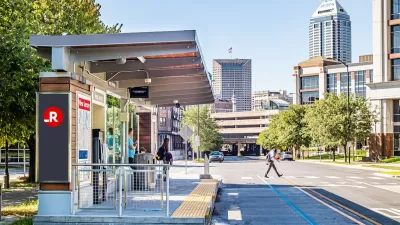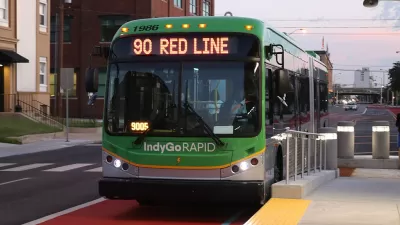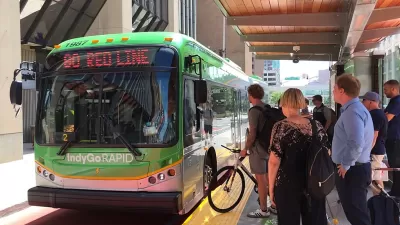After a year of outreach and research, Indy Connect has published its report yesterday outlining recommendations for the next 25 years of public transit expenditure. They call for $2.4 billion on transit and $8.4 on road expansion and maintenance.
The report cites the need for "a tripling of bus service, the development of bus rapid transit, and the creation of a commuter rail corridor would require the implementation of a local sales tax. A light rail line once considered has been put on the back burner." "The local metropolitan planning organization is likely to endorse the recommendations in December," writes Yonah Freemark.
While the measure's will connect much of the city's previously isolated suburbs to the south it is considerably "less than Indianapolis will need to expand transit mode share significantly, and in fact there was public support for significantly less roadway funding than the proposal advocates."
"Frustratingly, the proposal recommends significantly delaying the funding and implementation of the proposed light rail line along Washington Street, the only really rail-ready corridor in the region because of its relatively higher densities. But light rail is considered too expensive here and bus rapid transit would be built in its place." Another confusing recommendation calls for the creation of four bus lines running north from downtown to 38th street, all within 600 feet one another.
FULL STORY: New Transit Plan for Indianapolis Emphasizes Frequency Over Splash

Planetizen Federal Action Tracker
A weekly monitor of how Trump’s orders and actions are impacting planners and planning in America.

Restaurant Patios Were a Pandemic Win — Why Were They so Hard to Keep?
Social distancing requirements and changes in travel patterns prompted cities to pilot new uses for street and sidewalk space. Then it got complicated.

Map: Where Senate Republicans Want to Sell Your Public Lands
For public land advocates, the Senate Republicans’ proposal to sell millions of acres of public land in the West is “the biggest fight of their careers.”

Maui's Vacation Rental Debate Turns Ugly
Verbal attacks, misinformation campaigns and fistfights plague a high-stakes debate to convert thousands of vacation rentals into long-term housing.

San Francisco Suspends Traffic Calming Amidst Record Deaths
Citing “a challenging fiscal landscape,” the city will cease the program on the heels of 42 traffic deaths, including 24 pedestrians.

California Homeless Arrests, Citations Spike After Ruling
An investigation reveals that anti-homeless actions increased up to 500% after Grants Pass v. Johnson — even in cities claiming no policy change.
Urban Design for Planners 1: Software Tools
This six-course series explores essential urban design concepts using open source software and equips planners with the tools they need to participate fully in the urban design process.
Planning for Universal Design
Learn the tools for implementing Universal Design in planning regulations.
Heyer Gruel & Associates PA
JM Goldson LLC
Custer County Colorado
City of Camden Redevelopment Agency
City of Astoria
Transportation Research & Education Center (TREC) at Portland State University
Camden Redevelopment Agency
City of Claremont
Municipality of Princeton (NJ)





























